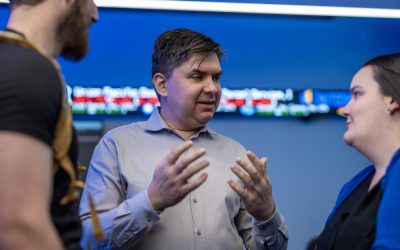Mathematics and Computer Science Dept
Mathematics
CONTACT
Sarah Abramowitz
John H. Evans Professor and Department Chair
Hall of Sciences 312
973-408-3346
macs@drew.edu
- Home >
- Academics >
- Programs >
- Mathematics >
- Mathematics and Computer Science Dept
Mathematics, Computer Science, Statistics, and Cybersecurity
These studies provide rigor of thought and a background that is in demand not only for careers directly using mathematics and computer science disciplines, but also in areas such as psychology, law, public health, finance, and business, where clear thinking and analysis are indispensable.
Majors (most also available as minors) include computer science, cybersecurity, mathematics, and statistics. Data science is also offered as a minor.
Students may also earn a Master’s in Data Analytics, or a dual degree (Bachelor’s + Master’s) in Cybersecurity (with New York University), Data Analytics (both degrees at Drew), Software Engineering (with Stevens Institute of Technology) or Teaching (both degrees at Drew).
For details, click on the programs below:
Related Programs
Computer Science Major and Minor
Computer science is centered around the practice of applied problem solving using technology. Rooted in the natural sciences and mathematics, it relates to many aspects of the social sciences (e.g., social network analysis, human-computer interaction, etc.), the arts (e.g., interaction design) and the humanities (e.g., media studies).
Drew’s computer science program is designed to stimulate critical thinking, problem solving, and creativity, together with effective communication skills that prepare students for academic and professional achievement. Computer science students at Drew learn by doing. In many courses, students and instructors explore core computing topics through projects, often for real customers. To date, these projects have resulted in many completed software applications installed and in use at our partner sites. Other opportunities for real-world learning include a variety of internships and collaborative research projects with our faculty and other students.
Link to Catalog for Computer Science Major information.
Link to Catalog for Computer Science Minor information
Cybersecurity Major
Our cybersecurity major is interdisciplinary, includes the foundations of software security, and has flexibility through elective offerings so students can opt to choose emphases in software, systems, or interdisciplinary contexts. By the end of the courses in the major, students will be able to identify common vulnerabilities in a software system and propose appropriate countermeasures and mitigation solutions according to best security industry practices. They will also be able to critically evaluate legal and ethical issues in cybersecurity practices and solutions.
Mathematics Major and Minor
Mathematics lies at the heart of the liberal arts. Based in abstraction and logical reasoning, mathematics is both a body of knowledge and an elegant and useful way of perceiving our world. Through mathematics, we can distill and describe the otherwise hidden patterns and relations among things. Because of this, mathematics finds ubiquitous application, from the natural and social sciences to the humanities and the arts. Precise abstraction and quantification play an increasingly important role in these diverse areas, and the study of mathematics can provide a foundation for any of them.
Link to Catalog for Math Major information.
Link to Catalog for Math Minor information
Statistics Major and Minor
Statistics is the practice of working with data using computational and quantitative techniques: collecting, organizing, modeling, analyzing, summarizing, and visualizing, often in order to make well-founded inferences or predictions from samples. Statistical methods and ways of thinking are important in many disciplines, from physical sciences to the humanities; and statistical evidence is crucial for high-stakes decision-making in realms like medicine, public policy, and finance.
The ability to handle and think critically about data, and to understand the design, assumptions, and limitations of statistical analysis and studies fit well within a liberal arts education. Drew’s statistics program has a strong computational, applied, and interdisciplinary focus that prepares students to more effectively contribute to their area of study and to better understand, improve, and protect the world in which we live.
Link to Catalog for Statistics Major information.
Link to Catalog for Statistics Minor information
Data Science Minor
In the last 40 years, data analysis and visualization, computer simulation, and computer modeling have become important tools for disciplinary research and inquiry. In many areas the change has been revolutionary, transforming the nature of knowledge itself. For example, without computing technology, we simply could not know what we do today about genomics, neuroscience, or geography. Further from traditional science disciplines, data—supported by tools that access, process, summarize, and visualize it—have given us Google Translate, GPS, instant access to centuries’ worth of music and art, and much more.
Data science has arguably democratized knowledge and information (if sometimes imperfectly). This minor will enable students to participate in the data revolution not only as consumers, but as creators and developers, and to understand and experience the role of data technology in modern research and decision making.
Master's in Data Analytics
The digitization of information—social networks, business transactions, healthcare records, and more—has transformed the world, necessitating a demand for people who understand all of the big data being collected and who can take action to help individuals, corporations, and organizations become smarter, faster, and ultimately more effective.
Through Drew’s Master’s of Science and graduate certificate programs in Data Analytics, you will:
- Learn how to obtain, prepare, and manage data from a wide variety of sources.
- Gain mastery of data analytical techniques.
- Leave with a portfolio of projects and work experience from experiential learning projects and internships.
Dual-Degree Programs
While pursuing your Bachelor’s degree at Drew, you can get on the fast track to early graduation and two degrees with Drew’s dual degree program. No matter your interest, our dual-degree programs double your resources, save you time, and help you save on tuition. Among the options are:
- MS in Cybersecurity — with New York University – Drew University to Cyber Fellows Guidelines
- BS or BE in Engineering — with Columbia University
- BS in Engineering — with Washington University in St. Louis
- MS in Software Engineering — with Stevens Institute of Technology
- MAT in Teaching — with Caspersen School of Graduate Studies
Latest News
Lisa Stites C’21, G’23 on Drew’s Master of Science in Data Science
Nov 20, 2024
Landing a data scientist position with the Internal Revenue Service
Professor Alex Rudniy on Drew’s Master of Science in Data Science
Jul 15, 2024
“Data science is beneficial across all industries”
Transfer Student Michael Gallaro C’25, G’26 Creates Individualized Experience at Drew
Jul 1, 2024
The student-athlete found his niche, creates special major
Drew University Graduate to Intern at NASA
May 29, 2024
Henry Arthur C’24 will spend his first summer after Drew researching earth rotation irregularities
Transforming Student Success: Drew University’s Journey with Möbius MAA Placement Test Suite
May 8, 2024
Digtal Ed’s story on Drew’s Mathemetics program
Drew University Class of 2024 Outcomes: Melvin Matias C’24
May 8, 2024
Pursuing a 4+1 Cybersecurity Dual-Degree at NYU
BIG Data.
BIGGER Future.
“I love how the upper level classes are structured here. They’re really project based. We get an initial understanding of the coding and the syntax, and then we take those tools and see if we can get them to do something. It’s how to build a project, and then how you can adapt your project to fit [the customers’] needs.”
Katie Jefferson C’20
Above and Beyond
From honors theses and conference presentations to prestigious scholarships, the limit on math and computer science students does not exist. Here are just a few recent highlights from our department’s students and faculty. Click the button below to see more.
Arianna Mendez with Yi Lu, 2024: “Comparative Analysis of the Effects of Mountaintop Removal Mining on Air and Water Quality In West Virginia.” DSSI
Clifford Wijaya with Steve Kass, 2024: “The Arithmetic Derivative.” DSSI
Dhruv Erry with Alex Rudniy: “Fine-tuning a Large Language Model.” DSSI
Deven Mistry with Alex Rudniy: “Email Spam Detection Using Large Language Models.” DSSI
Max Juliano with Alex Rudniy: “Surveying LLMs’ usage in Search Engines.” DSSI
Angelae Wunderle with Sarah Abramowitz, 2024: “Mathematical Movements: Bringing Dance into the Classroom.” Honors Thesis
Muhammad Mir with Yi Lu and Jennifer Olmstead, 2024: “Modeling Water Optimization in Jordanian Agricultural Economy.” Honors Thesis
Department Mission
The mission of the Department of Mathematics and Computer Science is to provide contemporary educational opportunities for Drew University community members who will benefit from knowledge of mathematics, statistics, data science, computer science, software engineering, cybersecurity, and the social and ethical environments in which we practice these disciplines.
We work with students who wish to pursue careers or graduate studies in fields that make use of these mathematical and computational subjects, as well as students, staff and faculty across disciplines working on interdisciplinary programs or projects.
A supportive community that encourages interdisciplinarity, a combination of theory and experiential learning, and the success of all of our students, we strive to help our students develop:
• A facility for effective problem analysis
• A keen sense of the appropriate application of existing problem-solving techniques and technologies, and the ability to innovate when necessary
• The ability to work effectively in teams and to communicate clearly, both orally and in writing.
• An appreciation of our disciplines’ relevance to various careers and to many aspects of modern life.





